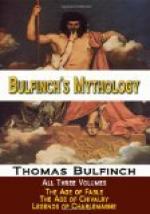In this perplexity, an old squire of Tristram’s reminded his master that the princess of Ireland, afterwards queen of Cornwall, had once cured him under circumstances quite as discouraging. He called Isoude of the White Hands to him, told her of his former cure, added that he believed that the Queen Isoude could heal him, and that he felt sure that she would come to his relief, if sent for.
Isoude of the White Hands consented that Gesnes, a trusty man and skilful navigator, should be sent to Cornwall. Tristram called him, and, giving him a ring, “Take this,” he said, “to the Queen of Cornwall. Tell her that Tristram, near to death, demands her aid. If you succeed in bringing her with you, place white sails to your vessel on your return, that we may know of your success when the vessel first heaves in sight. But if Queen Isoude refuses, put on black sails; they will be the presage of my impending death.”
Gesnes performed his mission successfully. King Mark happened to be absent from his capital, and the queen readily consented to return with the bark to Brittany. Gesnes clothed his vessel in the whitest of sails, and sped his way back to Brittany.
Meantime the wound of Tristram grew more desperate day by day. His strength, quite prostrated, no longer permitted him to be carried to the seaside daily, as had been his custom from the first moment when it was possible for the bark to be on the way homeward. He called a young damsel, and gave her in charge to keep watch in the direction of Cornwall, and to come and tell him the color of the sails of the first vessel she should see approaching.
When Isoude of the White Hands consented that the queen of Cornwall should be sent for, she had not known all the reasons which she had for fearing the influence which renewed intercourse with that princess might have on her own happiness. She had now learned more, and felt the danger more keenly. She thought, if she could only keep the knowledge of the queen’s arrival from her husband, she might employ in his service any resources which her skill could supply, and still avert the dangers which she apprehended. When the vessel was seen approaching, with its white sails sparkling in the sun, the damsel, by command of her mistress, carried word to Tristram that the sails were black.
Tristram, penetrated with inexpressible grief, breathed a profound sigh, turned away his face, and said, “Alas, my beloved! we shall never see one another again!” Then he commended himself to God, and breathed his last.
The death of Tristram was the first intelligence which the queen of Cornwall heard on landing. She was conducted almost senseless into the chamber of Tristram, and expired holding him in her arms.
Tristram, before his death, had requested that his body should be sent to Cornwall, and that his sword, with a letter he had written, should be delivered to King Mark. The remains of Tristram and Isoude were embarked in a vessel, along with the sword, which was presented to the king of Cornwall. He was melted with tenderness when he saw the weapon which slew Moraunt of Ireland,— which had so often saved his life, and redeemed the honor of his kingdom. In the letter Tristram begged pardon of his uncle, and related the story of the amorous draught.




